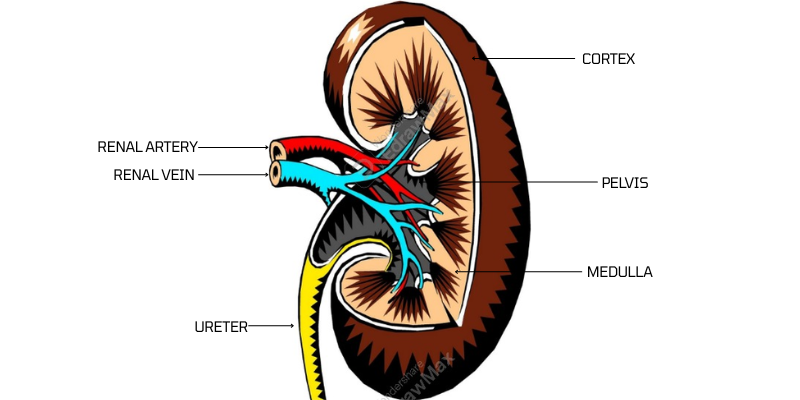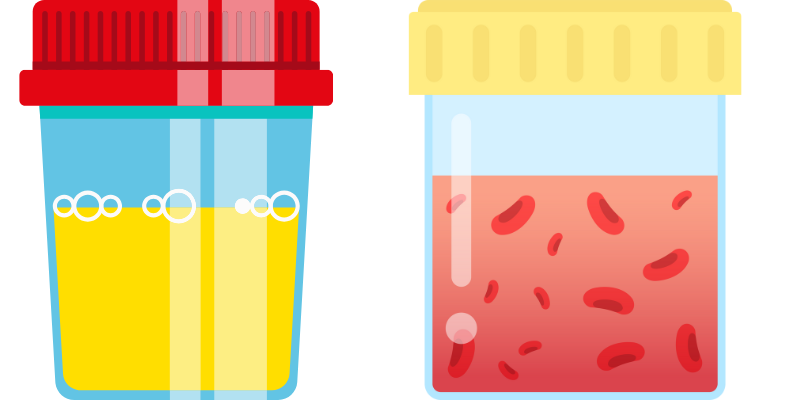Introduction: Your Kidneys – The Unsung Heroes and the Silent Threat
Kidney Disease Symptoms? We often meticulously track our heart health, worry about our lungs, or focus on maintaining a healthy weight. But what about our kidneys? These bean-shaped powerhouses, often working quietly in the background, are your body’s sophisticated filtering system, vital for overall well-being. The challenge? Early kidney disease is often a silent condition, creeping up without obvious symptoms until significant damage has occurred.
Consider this: an estimated 35.5 million U.S. adults have kidney disease, and most don’t even know they have it. In fact, “only 10% of people with chronic kidney disease know that they have it,” according to the National Kidney Foundation. This staggering statistic underscores the critical need for awareness.
This blog post aims to shed light on the subtle, early signs of kidney disease that are easy to overlook. We’ll delve into what these symptoms mean and, importantly, empower you with natural prevention strategies. Whether you’re a member of the general public curious about your health, a health-conscious individual actively managing your well-being, or someone with risk factors for kidney disease, this information is for you.

Table of Contents
A Quick Look: What Your Kidneys Do For You
Before we explore the signs of trouble, let’s briefly appreciate the crucial roles your kidneys play every single day:
- Filtering Masters: They filter waste products and excess fluids from your blood, which are then excreted as urine (Mayo Clinic; The Iowa Clinic).
- Blood Pressure Regulators: They help regulate your blood pressure.
- Mineral Balancers: They maintain a healthy balance of electrolytes and minerals in your blood, such as sodium, potassium, and calcium (National Kidney Foundation).
- Hormone Producers: They produce hormones essential for making red blood cells (erythropoietin) and activate Vitamin D, which is crucial for bone health (Mayo Clinic; National Kidney Foundation).
When kidney function is impaired, these vital processes are disrupted, leading to a buildup of waste and fluids, electrolyte imbalances, and other health complications.

The Stealthy Advance: Why Early Kidney Disease is a “Silent” Condition
One of the most challenging aspects of kidney disease is its “silent” nature in the early stages. Often, individuals in Stage 1 to 3 of Chronic Kidney Disease (CKD) experience few or no noticeable symptoms. This is because the body is remarkably adept at compensating for a gradual decline in kidney function (Mayo Clinic; NHS). The damage typically occurs slowly, over several months or even years (Mayo Clinic).
Even when early symptoms do manifest, they are often non-specific. This means they can easily be attributed to other, less serious conditions like stress, aging, or a common cold (Mayo Clinic; National Kidney Foundation). This ambiguity contributes to the high rates of undiagnosed cases. As The Iowa Clinic notes, “90 percent of people who have CKD don’t even know it.” Similarly, the National Institute of Diabetes and Digestive and Kidney Diseases (NIDDK) states that “as many as 9 in 10 adults who have CKD are not aware they have the disease.” This lack of awareness highlights why understanding potential early indicators is so vital.
Decoding the Whispers: 7 Silent Signs of Early Kidney Disease You Can’t Ignore
While early kidney disease is often asymptomatic, certain subtle changes might offer clues. If you experience one or more of these persistently, especially if you have risk factors, it’s worth a discussion with your doctor.
1. Persistent Fatigue and Trouble Concentrating
Layman’s Description: You might feel unusually tired or weak, even after getting what seems like enough rest. Difficulty concentrating or a sense of “brain fog” can also occur.
Scientific Explanation: Healthy kidneys play a role in removing toxins and impurities from the blood. When kidney function declines, these substances can accumulate. Furthermore, kidneys produce a hormone called erythropoietin, which signals the body to make red blood cells. Damaged kidneys produce less erythropoietin, leading to a decrease in red blood cells (anemia). Anemia means less oxygen is delivered to your muscles and brain, causing fatigue, weakness, and difficulty concentrating (National Kidney Foundation; The Iowa Clinic).
Subtlety/Caveat: Fatigue is a very common symptom with many potential causes. However, if it’s persistent and unexplained, it shouldn’t be dismissed, particularly if other signs are present.

2. Changes in Urination (Frequency, Appearance)
Layman’s Description: You might notice changes in your bathroom habits, such as:
- Urinating more frequently, especially at night (nocturia) (National Kidney Foundation; Better Health Channel).
- Urinating less often or passing smaller amounts of urine.
- Urine that is persistently foamy or bubbly, requiring multiple flushes to clear (National Kidney Foundation; Richmond University Medical Center).
- Urine that is pale, dark (cola-colored), or contains blood (hematuria) (National Kidney Foundation).
Scientific Explanation:
- Frequency Changes: Damage to the kidney’s filters can increase the urge to urinate, particularly at night (National Kidney Foundation). Conversely, in later stages or with certain types of kidney issues, urine output might decrease.
- Foamy Urine: This often indicates the presence of excess protein, particularly albumin, in the urine (proteinuria). Healthy kidneys filter waste and keep protein in the blood. Damaged filters allow protein to leak into the urine. This is an early sign of kidney damage (National Kidney Foundation). In Stage 1 CKD, the presence of albumin in urine (albuminuria) can be an indicator even with a normal eGFR (Kidney Fund).
- Blood in Urine: Healthy kidneys prevent blood cells from passing into the urine. Damaged filters can allow red blood cells to “leak” out (National Kidney Foundation).
Subtlety/Caveat: Changes in urination can also be due to urinary tract infections, prostate issues in men, or simply increased fluid intake. However, persistent foamy urine or blood in the urine always warrants medical attention.

3. Swelling (Edema) in Feet, Ankles, or Around Eyes
Layman’s Description: You might notice puffiness around your eyes, especially in the morning, or swelling in your feet, ankles, legs, or hands.
Scientific Explanation: Decreased kidney function can lead to sodium retention. Excess sodium in your body causes fluid to build up in your tissues, leading to swelling (edema). Puffiness around the eyes can also occur when kidneys leak a large amount of protein into the urine, reducing the protein levels in your blood. This can cause fluid to move into the tissues around the eyes (National Kidney Foundation; Mayo Clinic).
Subtlety/Caveat: Swelling can also be a sign of heart disease, liver disease, or chronic leg vein problems. However, if it’s new or persistent, it’s important to get it checked.

4. Dry and Itchy Skin (Pruritus)
Layman’s Description: You might experience persistent, unexplained dry and itchy skin that doesn’t resolve with typical moisturizers.
Scientific Explanation: Healthy kidneys are crucial for removing waste from the blood and maintaining the right balance of minerals and nutrients. When kidneys aren’t functioning well, waste products can build up in the blood. This, along with an imbalance in minerals like phosphorus, can lead to severe itching. Dry and itchy skin can be a sign of mineral and bone disease that often accompanies advanced kidney disease (National Kidney Foundation; The Iowa Clinic).
Subtlety/Caveat: Dry skin is common, especially in certain climates or with age. However, intense, persistent itching without an obvious rash should be investigated.

5. Trouble Sleeping (Insomnia)
Layman’s Description: You may find it difficult to fall asleep or stay asleep, leading to unrefreshing sleep.
Scientific Explanation: When the kidneys aren’t filtering properly, toxins can build up and remain in the blood instead of being excreted through urine. This accumulation of toxins can make it difficult to sleep (National Kidney Foundation). Additionally, sleep apnea, a condition where breathing repeatedly stops and starts during sleep, is more common in individuals with Chronic Kidney Disease (National Kidney Foundation; Mayo Clinic).

Subtlety/Caveat: Many factors can affect sleep. However, if sleep problems are chronic and accompanied by other potential kidney-related symptoms, it’s worth mentioning to your doctor.
6. Poor Appetite or Nausea
Layman’s Description: You might experience a loss of appetite, feel nauseous frequently, or find that food tastes different, perhaps metallic.
Scientific Explanation: A buildup of waste products in the blood, a condition known as uremia, can result from reduced kidney function. Uremia can affect your appetite, cause nausea, and even vomiting. Some people also report a metallic taste in their mouth or uremic fetor (ammonia-like breath), which can make food unappealing (Mayo Clinic; National Kidney Foundation; The Iowa Clinic).
Subtlety/Caveat: Occasional nausea or appetite changes are common. Persistent issues, especially with weight loss, should be evaluated.

7. Muscle Cramps
Layman’s Description: You might experience frequent, unexplained muscle cramps, often in the legs.
Scientific Explanation: Impaired kidney function can lead to imbalances in electrolytes, such as low calcium levels or poorly controlled phosphorus. These imbalances can contribute to muscle cramping (National Kidney Foundation; Mayo Clinic).
Subtlety/Caveat: Muscle cramps can be caused by dehydration or exertion. However, if they are frequent and not clearly linked to these causes, they could be a sign of an underlying issue.

When to Knock on Your Doctor’s Door
It’s crucial to remember that many of these symptoms are non-specific and can be caused by a variety of other conditions. However, if you notice one or more of these signs and they are persistent, new, or cause you concern, it’s time to consult your doctor. This is especially important if you have known risk factors for kidney disease, such as:
- Diabetes
- High blood pressure (hypertension)
- A family history of kidney failure
- Older age (over 60)
- Obesity
(Sources: Mayo Clinic, National Kidney Foundation)
Your doctor can perform simple tests to assess your kidney health. These typically include:
- Urine tests: An Albumin-to-Creatinine Ratio (ACR) test checks for albumin (a type of protein) in your urine. Its presence can be an early sign of kidney damage (Kidney Fund).
- Blood tests: An estimated Glomerular Filtration Rate (eGFR) is calculated from the level of creatinine (a waste product) in your blood. The eGFR indicates how well your kidneys are filtering waste (Cleveland Clinic).
Early detection is paramount. Identifying kidney disease in its early stages allows for interventions that can help slow its progression, manage symptoms, and prevent complications (The Iowa Clinic; Kidney Specialists).
Real Stories, Real Impact: The Power of Listening to Your Body
Personal stories often bring medical information to life, illustrating the importance of awareness and early action. Here are a few experiences shared by the National Kidney Foundation:
Lukas’s Story: Lukas was diagnosed with stage 2 kidney disease at the young age of 14, an unexpected discovery following treatment for heat stroke. Instead of letting the diagnosis define him negatively, Lukas used it as motivation. “Changing my lifestyle and taking all that medication wasn’t fun, but it saved my kidneys,” he shared. Fifteen years later, thanks to early intervention and consistent management, Lukas is still at stage 2 and feels possibly healthier than when he was first diagnosed. His story is a testament to the positive impact of early detection and proactive lifestyle changes.
Lily’s Story: Lily was diagnosed with stage 1 Chronic Kidney Disease (CKD) at age six. A routine ultrasound revealed kidney issues linked to a genetic disorder. Now twelve, Lily’s kidney function has remained stable. Her mother, Asha, explains, “We’ve taken many steps to help her maintain it. She gets her kidneys checked every four to six months. She’s learned how to pay attention to how she’s feeling and make choices that are good for her body.” Lily’s journey highlights how proactive management, even from a very young age, can help maintain kidney health when risk factors are known.
Janet’s Story: Janet’s experience underscores the importance of accurate diagnosis and self-advocacy. Initially diagnosed with stage 2 kidney disease based on an outdated eGFR equation that included race, Janet, aware of her high blood pressure and other symptoms like anemia and foamy urine, pushed for a retest using the new race-free formula. This led to a correct diagnosis of stage 3a kidney disease. “My correct staging makes all the difference in my diet and treatment,” Janet stated. Her story emphasizes that an accurate diagnosis is crucial for appropriate care and that patients play a vital role in their healthcare journey.

These stories highlight different paths but share common themes: the unexpected nature of kidney disease, the critical role of early detection (whether through routine checks or investigating symptoms), and the profound impact of proactive management and lifestyle adjustments.
Nourishing Your Kidneys: Natural Prevention Tips for Long-Term Health
While some risk factors for kidney disease like age and family history are beyond our control, many lifestyle choices can significantly impact kidney health and help prevent disease or slow its progression. Here are some evidence-supported natural prevention tips:
1. Adopt a Kidney-Friendly Diet
- Reduce Sodium Intake: Aim for less than 2,300 milligrams of sodium per day. Excess sodium can increase blood pressure, a major risk factor for kidney disease (NIDDK). Read food labels and limit processed foods, which are often high in sodium.
- Limit Added Sugars: Strive to keep added sugars to less than 10% of your daily calories. This helps with weight management and overall metabolic health, indirectly benefiting your kidneys (NIDDK).
- Choose Whole, Healthy Foods: Focus on a diet rich in fresh fruits, vegetables, whole grains, and low-fat or fat-free dairy products (NIDDK). These foods provide essential nutrients and fiber.
- Moderate Protein (If Advised): For individuals with existing kidney issues, a doctor or dietitian might recommend a lower-protein diet to reduce the workload on the kidneys (Mayo Clinic; PMC9981552). Always consult a healthcare professional before making significant changes to your protein intake.
- Consider the DASH Diet: The Dietary Approaches to Stop Hypertension (DASH) diet is often recommended. It’s rich in fruits, vegetables, low-fat dairy, and whole grains, and low in sodium, saturated fat, total fat, and red meats. It has been shown to be beneficial for blood pressure and kidney health (National Kidney Foundation).
2. Stay Hydrated (Wisely)
Water helps your kidneys remove waste from your blood in the form of urine. Aim to drink enough fluids throughout the day, with water being the best choice. However, if you already have kidney disease, your doctor might advise you to limit your fluid intake, so always follow medical guidance.
3. Maintain a Healthy Lifestyle
- Engage in Regular Physical Activity: Aim for at least 30 minutes of moderate-intensity exercise most days of the week. Physical activity helps control blood pressure, manage weight, and improve overall cardiovascular health (NIDDK; CDC).
- Achieve and Maintain a Healthy Weight: Obesity is a significant risk factor for developing conditions like diabetes and high blood pressure, which in turn increase the risk of kidney disease (Mayo Clinic; NIDDK).
- Get Enough Sleep: Aim for 7-8 hours of quality sleep per night. Adequate sleep is essential for overall health, including hormone regulation and stress management, which can indirectly support kidney health (NIDDK).
- Stop Smoking: Smoking damages blood vessels, reduces blood flow to the kidneys, and can worsen existing kidney disease (Mayo Clinic; NIDDK). Quitting smoking is one of the best things you can do for your kidneys and overall health.
- Limit Alcohol Consumption: Excessive alcohol intake can raise blood pressure and add empty calories, contributing to weight gain. If you drink alcohol, do so in moderation (NIDDK).
- Manage Stress: Chronic stress can impact your physical health. Explore stress-reducing activities like meditation, yoga, tai chi, or spending time in nature (NIDDK).
4. Be Cautious with Medications & Supplements
- Nonsteroidal Anti-Inflammatory Drugs (NSAIDs): Regular, long-term use of over-the-counter pain relievers like ibuprofen and naproxen can damage your kidneys, especially if you already have reduced kidney function. Use them sparingly and consult your doctor about safer alternatives if you need long-term pain relief (NIDDK; Mayo Clinic).
- Herbal Supplements: While some herbal supplements may seem harmless, certain products can be harmful to your kidneys, especially if you have existing kidney disease. Always discuss any supplements with your doctor before taking them (National Kidney Foundation).
5. Manage Underlying Conditions (Crucial for At-Risk Groups)
- Control Blood Sugar: If you have diabetes, diligent blood sugar management is critical. Diabetes is a leading cause of kidney disease (Mayo Clinic; CDC; NYU Langone Health).
- Manage High Blood Pressure: Hypertension is another major cause of kidney damage. Work with your doctor to keep your blood pressure within the target range through lifestyle changes and, if necessary, medication (Mayo Clinic; CDC).
- Attend Regular Check-ups: If you are at risk for kidney disease, ensure you have regular check-ups that include kidney health monitoring (blood pressure measurement, urine tests, and blood tests for kidney function) (National Kidney Foundation).
“Maintaining holistic wellness—including stress management and positive mental health—has a meaningful impact on kidney health. Read more about wellness strategies…“

The Ripple Effect of Prevention: Expert Voices & Encouragement
The importance of prevention and managing risk factors is consistently emphasized by medical experts. Dr. Andrew Bentall of the Mayo Clinic states, “Managing risk factors such as high blood pressure, diabetes and obesity will reduce the chances of developing kidney disease” (Mayo Clinic News Network). This sentiment is echoed by consensus-based expert opinions which recommend screening for kidney disease in individuals with known risk factors like diabetes and hypertension (Nature Reviews Nephrology).
The impact of early intervention can be substantial. Research indicates that if kidney disease is detected early, its progression to end-stage renal disease (ESRD) can be reduced by up to 50% (Kidney Specialists). This highlights the power of proactive health management.
Kidney disease is recognized as a growing global public health concern, and prevention is a cornerstone of addressing this challenge worldwide (Nature Reviews Nephrology; PMC7076785). While existing kidney damage may not always be reversible, the good news is that its progression can often be significantly slowed or even halted with timely diagnosis and consistent, proactive measures (The Iowa Clinic). This offers a message of hope and underscores the value of the preventive strategies discussed.
Your Kidney Health Journey: Key Takeaways & Next Steps
Navigating the path to optimal kidney health begins with understanding the often-silent nature of early kidney disease and recognizing the profound impact of early detection and prevention. The journey is one of awareness, proactive choices, and partnership with your healthcare providers.
Key Learnings & Health Strategies at a Glance
| Strategy Focus | Core Elements | Your Action Plan | Key Benefits | Who This Helps Most |
|---|---|---|---|---|
| Symptom Awareness | Recognizing the 7 silent signs (fatigue, urine changes, swelling, itchy skin, sleep issues, poor appetite, muscle cramps). | Pay attention to your body. Note any persistent, unusual, or worrying changes. Keep a health journal if helpful. | Enables early consultation with a doctor, leading to potential for earlier diagnosis and intervention. | Everyone, especially individuals in at-risk groups (diabetes, hypertension, family history). |
| Lifestyle Shield | Adopting a kidney-friendly diet (e.g., DASH-like, low sodium, low added sugar), staying adequately hydrated, regular physical activity, avoiding smoking, limiting alcohol, managing stress. | Start small. Implement 1-2 manageable changes each week to build sustainable habits. Consider consulting a dietitian for personalized dietary advice. | Reduces key risk factors for kidney disease, supports overall kidney function, and improves general health and well-being. | Everyone. These are foundational habits for long-term health. |
| Proactive Management | Attending regular medical check-ups, diligently managing existing conditions like diabetes and high blood pressure, being cautious with medications (especially NSAIDs) and supplements. | Schedule and attend regular doctor visits. Adhere to prescribed treatment plans for any existing health conditions. Always discuss all medications and supplements with your doctor. | Helps to slow potential progression of kidney disease, manage complications effectively, and protect long-term kidney health. | Individuals with known risk factors, those already diagnosed with early-stage kidney disease, or those managing related conditions. |
Charting Your Course: A Roadmap to Better Kidney Health
Our Recommendation: Adopt a “Listen & Act” Approach to Kidney Wellness.
- Why this approach? This strategy combines vigilance (listening to your body’s signals and recognizing personal risk factors) with proactive steps (acting on prevention strategies and seeking timely medical advice when needed). It’s a logical, empowering, and reader-friendly way to take control of your kidney health, offering the best chance to protect these vital organs.
- Putting it into Practice:
- Information is Power: Understand the silent symptoms discussed in this post. Don’t panic if you occasionally experience one, but don’t ignore persistent or concerning signs.
- Prevention is Your Best Defense: Focus on the natural prevention tips outlined. Small, consistent lifestyle changes can accumulate to make a significant difference. Prioritize managing known risk factors like diabetes and high blood pressure with unwavering commitment.
- Partner with Your Doctor: If you notice concerning symptoms, or if you have risk factors for kidney disease, schedule a check-up. Simple urine and blood tests can assess your kidney health. Discuss any concerns openly and honestly with your healthcare provider. They are your most important ally in this journey.
Information throughout this post is supported by reputable sources such as the National Kidney Foundation, Mayo Clinic, and the NIDDK, ensuring an authoritative and expert voice.
Strengthening Your Resolve: Key Strategies for Success
- Why these strategies? They are designed to enhance your absorption of this crucial information and encourage a long-term commitment to kidney health, moving from passive reading to active engagement.
- Execution Points:
- Symptom Savvy: Don’t just skim the list of symptoms. Reflect on whether any feel familiar or have been persistent for you. Using a health journal to track changes over time can be a valuable tool for discussions with your doctor.
- Prevention Plan – One Step at a Time: Avoid feeling overwhelmed by trying to change everything at once. Pick one or two prevention tips that seem most achievable for you right now. Master those, then gradually incorporate others. Make it a sustainable journey, not a sprint.
- Real Stories, Real Motivation: Remember the case studies of Lukas, Lily, and Janet. Their experiences demonstrate that early action, self-advocacy, and consistent management can significantly and positively impact one’s health trajectory, even in the face of a kidney disease diagnosis.
Join the Conversation & Take Action
Your kidney health matters profoundly. We hope this information has been enlightening and empowering.
- Ask & Share: What are your thoughts on this topic? Do you have personal experiences with early kidney symptoms or successful prevention strategies you’d like to share? Please comment below – your insights could help others!
- Spread the Word: Knowledge is power. Share this post with friends, family, and colleagues, especially those who might be at risk for kidney disease. Raising awareness can genuinely save lives.
- Your Next Step: If anything in this post has resonated with your personal health concerns, or if you know you have risk factors for kidney disease, please don’t delay. Make an appointment with your doctor to discuss kidney health screening. Your kidneys will thank you!
This article is for informational purposes only and does not constitute medical advice. Always consult with a qualified healthcare professional for any health concerns or before making any decisions related to your health or treatment.
